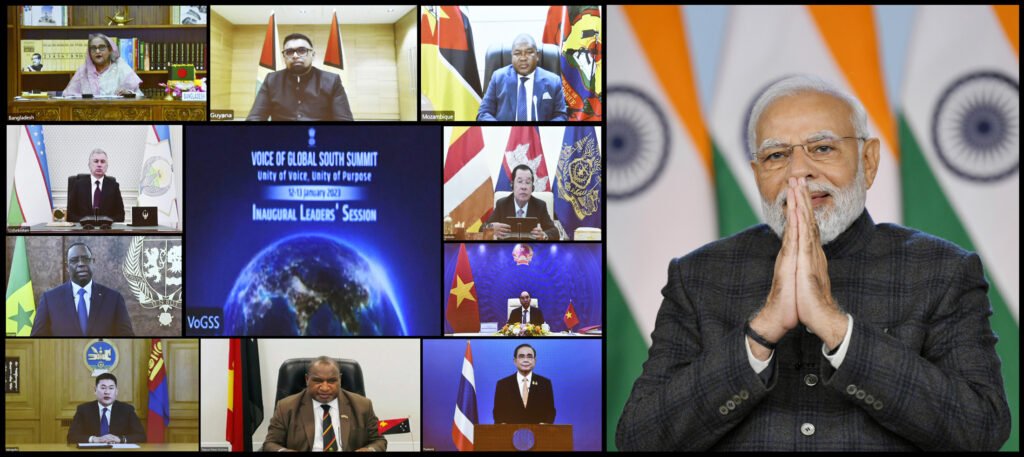|
Listen to article
Getting your Trinity Audio player ready...
|

India recently initiated and conducted a two-day special virtual summit titled ‘Voice of Global South Summit’. The main purpose was to bring together countries of the Global South on a common platform in order for them to share concerns, priorities, interests and values covering a wide array of issues. About 120 countries participated in this Summit, some of which are not even members of the G-20. By doing so, India is reconnecting with the third world and bringing to the forefront the issues and concerns that they want to discuss.
Voice of Global South Summit has been envisioned along the lines of the Indian philosophy of ‘Vasudhaiva Kutumbakam’ (The world is one big family) and Prime Minister Narendra Modi’s vision of ‘Sabka Saath, Sabka Vikaas, Sabka Vishwas, Sabka Prayas’, the theme of the Summit was ‘Unity of Voice, Unity of Purpose’.
The Summit in itself is not a part of the G-20 endeavour. However, as India takes on the role of presiding over a powerful summit like the G-20, it aspires to create a bigger impact in the world. In doing so, India is emerging as a bridge between the developing and the developed world. India has recognized that without a substantive dialogue between developed and developing countries, these lines cannot be blurred.
At the Summit, India expressed willingness to support its partners from the global south in different fields sharing and discussing the experiences of the countries. The Prime Minister pushed for a ‘human-centered’ globalization that would focus on issues of importance. These included issues like climate change and ensuring opportunities for the skilled population and access to resilient renewable energy.
Bridging gaps
A shift in India’s policy has been observed through this engagement with the Global South. This first step in reaching a collective South-South understanding of global issues is a signal that India could work and amplify the aspirations of its partners from the Global South.
India has always been vocal about raising issues about the third world right from the time of Independence. In fact, it was one of the founding members of the Non-Alignment Movement (NAM) at a time when the world was divided between the areas of influence of the United States and the Soviet Union. Over the years, India has evolved its own unique foreign policy. By trying to secure its interests while at the same time looking out for others in need too, India is becoming a strong voice in the global arena.
By abandoning the old NAM, India has been engaging in many new regional institutions including BIMSTEC, QUAD, SCO, BRICS, ASEAN, G-20 and others, cutting across North-South Divide and Power Blocs representing West and East. These groupings comprise of both developed and developing countries. Immediately after independence, India emerged as the ‘messiah’ of third-world countries. NAM in itself was more like an attack on the West which may have been the reason that it did not take off as it was expected to.
Indian foreign policy was bent towards following an approach of grouping with countries like ourselves. This resulted in collaborations between Asian and African countries that had recently gained or were gaining independence. India opened more to the world after carrying out internal reforms, but that was mostly in the trade and commerce sector.
Engagement with the World post-2014
In 2014, for the inception of the new government, SAARC leaders were invited. Inviting all our neighbours for the oath-taking statement sent a strong message to these nations. India was ready to show the change in its foreign policy. At the same time, it also showed that India wishes to prioritize its neighbours. India has been very proactive in engaging with countries from across the world that it had not cultivated strong relations with earlier. From countries like Senegal, Tunisia, Algeria, Morocco, Egypt and others in Africa; Indonesia, Singapore, Malaysia, Vietnam, and others in the Asia-Pacific region; many nations from the Caribbean Islands and of course South Asian states like Maldives, Mauritius, Bangladesh, Nepal, Bhutan, Afghanistan which have historical and socio-cultural ties with India to developed countries like Sweden, Norway, Denmark and others in Europe, India has been forging key bilateral relations in defence, energy, security, trade, environment and many other sectors. In addition to this, India has intensified its interactions with powerful nations like United States, Britain, Russia, Australia, and Japan within different groupings sharing common interests.
India has been coming on its own in the global platform, taking decisions in the national interest. At the same time, it also looks for balance by engaging with the Global North and the Global South on different issues.
The COVID-Pandemic has shown how fragile the international system is. It is time for strengthening global, national and regional institutions that could provide support to countries in exigent circumstances. In such a situation, New Delhi could use the moment to try and bridge the differences between the North and the South as none of the problems can be solved today without some international cooperation and dialogue.
The announcement of the decision to establish a Global South Centre of Excellence tasked with seeking solutions to the problems affecting developing countries is a welcome step in this direction.






Add comment